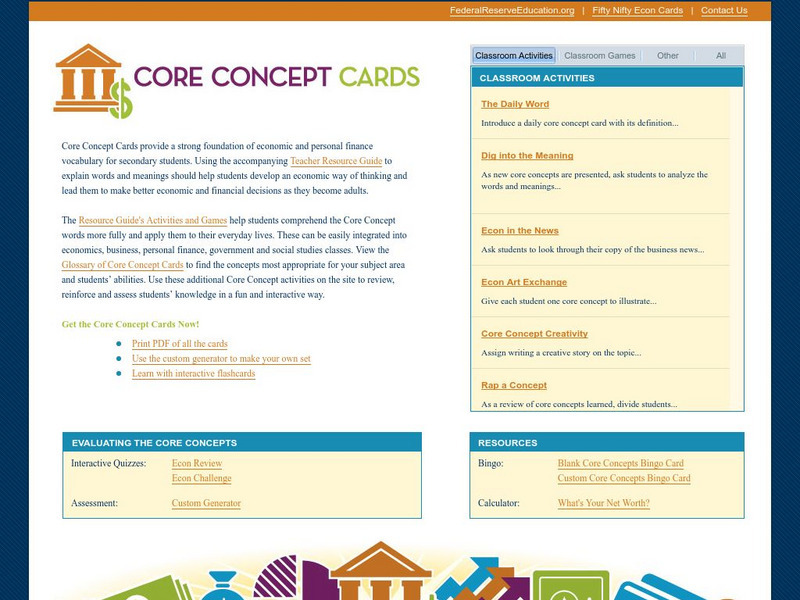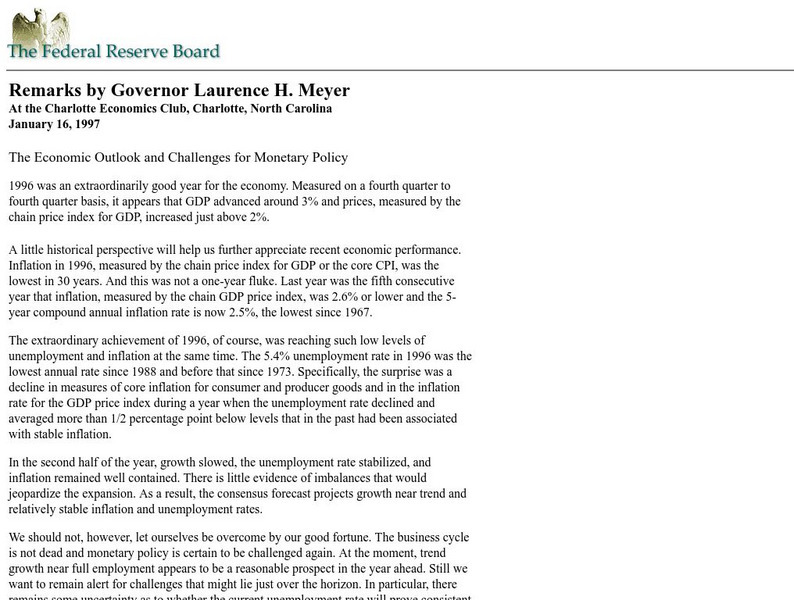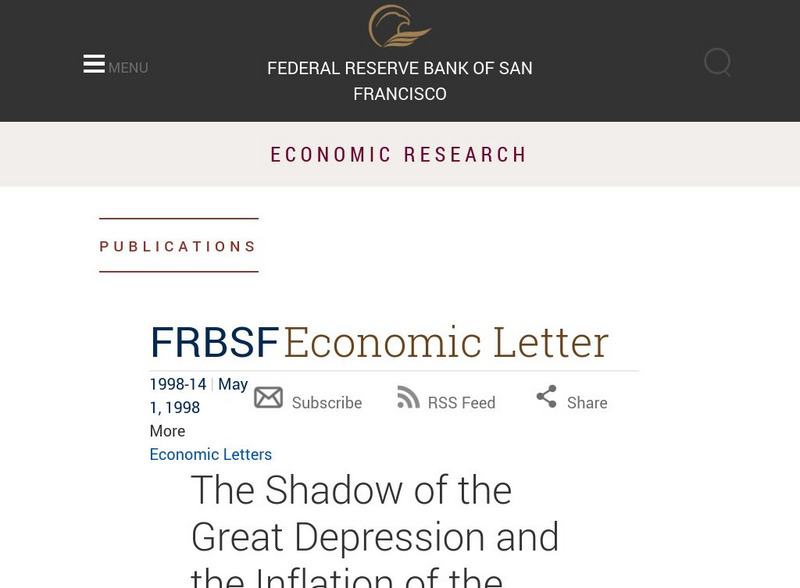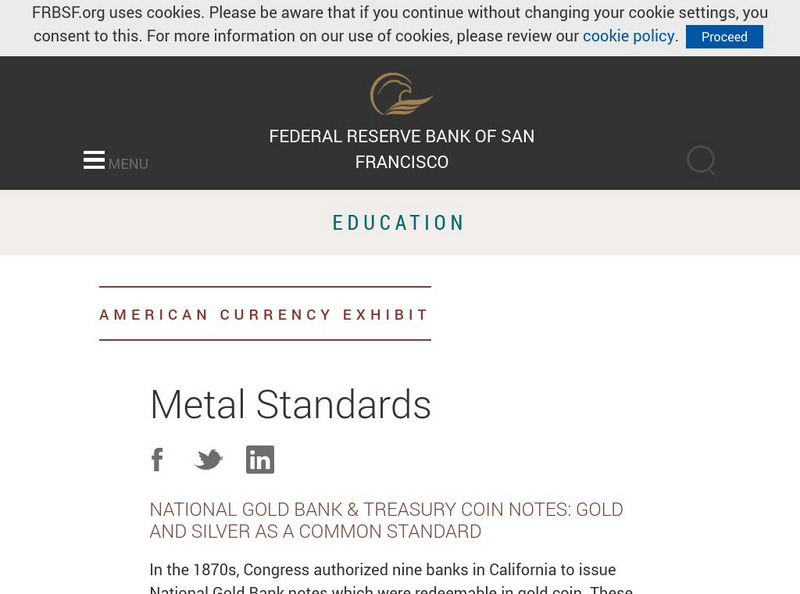Other
Federal Reserve Education: Core Concept Cards
Using Core Concept Cards is a quick way to reinforce economic and financial literacy concepts. This site offers quite a few ways to use these Core Concept Cards, including games to play with students, and interactive flash cards that...
The Federal Reserve System
Federal Reserve Board: The Economic Outlook and Challenges for Monetary Policy
A speech given in 1997 which evaluated the economic outlook using the non-accelerating inflation rate of unemployment, or NAIRU, and outlined challenges for monetary policy. (January 16, 1997)
The Federal Reserve System
Federal Reserve Board: Electronic Check Conversion
Article describing the process of electronic check conversion and the rights of the consumer presented in a question-and-answer format.
Federal Reserve Bank
Federal Reserve Bank of St. Louis: Civilian Unemployment Rate
Provides historical percent, seasonally adjusted, civilian unemployment data for each month from 1948 to the present.
Other
Federal Reserve Bank of Dallas: Economic Drivers of Texas [Ppt]
This PowerPoint presentation explores the different tools that are used by economists to analyze the Texas economy. Through their analysis, you are able to see which industries and business ventures are having the most impact on the...
Federal Reserve Bank
Federal Reserve Bank of Atlanta: Spotting Counterfeit Currency
This resource explains how to detect counterfeit money, what to do if you receive it, and the laws against it.
Federal Reserve Bank
Federal Reserve Bank of Philadelphia: Understand & Improve Your Credit Score
Find out how your credit score is figured, why it is important to keep a high credit score, and some tips on how to keep your rating high.
Federal Reserve Bank
Federal Reserve Bank of Philadelphia: What Your Credit Report Says About You
Find out why your credit report is so important to your well-being in today's economy. See where the reports come from, who can see your credit report, what type of information is on it, as well as other important facts about credit scores.
Federal Reserve Bank
Federal Reserve Bank of Minneapolis: Why Johnny Can't Choose
If you don't know what the economy is or how it works, this site is for you. It is broken into subsections that make it easy to understand the economy.
Other
Federal Reserve Bank of Cleveland: Inflation Central
Students track inflation in the United States and across the world. The resource consists of articles on economic trends, economic commentary, charts, and graphs.
Federal Reserve Bank
Federal Reserve Bank: Inflation of the 1970s
This U.S. Fed white paper defines the reasons for this decade of high inflation.
Federal Reserve Bank
Federal Reserve Bank San Francisco: American Currency Exhibit: Metal Standards
This site provides information about the expansion of the United States Currency, with links to other related sources.
Federal Reserve Bank
Federal Reserve Bank of St. Louis: What Is Driving Oil Prices?
As the world's demand for oil rapidly increases, so do the prices for it. Learn the factors causing high oil prices and who are the world's largest consumers of petroleum. Includes discussion questions. (Published Jan. 2005)
Federal Reserve Bank
Federal Reserve Bank of Philadelphia: Ten Mile Day [Pdf]
Using the book, Ten Mile Day, by Mary Ann Fraser, this lesson helps children understand division of labor, competition, and incentives in the workplace.
Federal Reserve Bank
Federal Reserve Bank of St. Louis: The Pickle Patch Bathtub [Pdf]
A activity based on The Pickle Patch Bathtub by Frances Kennedy, where students learn about making choices in how to spend money, and how to set goals and develop a savings plan.
Federal Reserve Bank
Federal Reserve Bank of Atlanta: Building Block Barter Lesson
Lesson plan for 3 - 5 graders about the advantages of using money instead of bartering.
Federal Reserve Bank
Federal Reserve Bank of Atlanta: What Is an Entrepreneur?
Introduces students to the motivations and decision making of entrepreneurs and discusses their economic impact.
Federal Reserve Bank
Federal Reserve Bank of Atlanta: Budgeting
Illustrates the difference between sources of income and fixed versus variable expenses through a simple budget plan. Introduces students to the basics of budgeting.
Federal Reserve Bank
Federal Reserve Bank of Atlanta: Where Do You Bank?
Introduces students to the factors they should consider when they choose banking services.
Federal Reserve Bank
Federal Reserve Bank of Atlanta: Supply & Demand
Highlights basic concepts such as the law of supply and demand, changes in demand and supply versus changes in the quantity demanded and the quantity supplied, the determinants of demand and supply, and market equilibrium.
Federal Reserve Bank
Federal Reserve Bank of Atlanta: Fiscal and Monetary Policy
Defines fiscal and monetary policy and highlights their key differences.
Federal Reserve Bank
Federal Reserve Bank of Atlanta: Gross Domestic Product
Highlights the basics about GDP.
Federal Reserve Bank
Federal Reserve Bank of Atlanta: Saving and Investing
Explains the Rule of 72 with examples of compound interest and its power to help grow students' money.
Federal Reserve Bank
Federal Reserve Bank of Atlanta: Economic Systems
Helps students discover the three basic economic questions and how each system answers these questions, identify several key advantages and disadvantages for each economic system, recognize some economic indicators that can measure...










